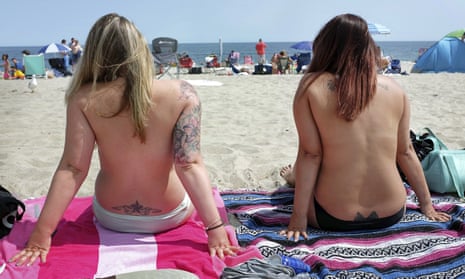New Hampshire’s highest court has upheld the conviction of three women who were arrested for going topless on a beach, finding their constitutional rights were not violated.
In a 3-2 ruling, the court decided that an indecent exposure law in the New Hampshire city of Laconia does not discriminate on the basis of gender or violate the women’s right to free speech.
Citing rulings by several other courts, associate justice Anna Barbara Hantz Marconi wrote that courts “generally upheld laws that prohibit women but not men from exposing their breasts against equal protection challenges.”
“We have found that the ordinance does not violate the defendants’ constitutional rights to equal protection or freedom of speech under the State and Federal Constitutions,” Marconi wrote. “As such, it does not unduly restrict the defendants’ fundamental rights. Accordingly, we agree with the trial court that the City had the authority to enact the ordinance.”
In a dissenting opinion, associate justice James P. Bassett with senior associate Justice Gary E. Hicks concluded the ordinance was unconstitutional because it treats men and women differently.
Heidi Lilley, Kia Sinclair and Ginger Pierro are part of the Free the Nipple campaign, a global campaign advocating for the rights of women to go topless. They were arrested in 2016 after removing their tops at a beach in Laconia and refusing to put them on when beachgoers complained. Pierro was doing yoga, while the two others were sunbathing.
The Laconia law on indecent exposure bans sex and nudity in public, but singles out women by prohibiting the “showing of female breast with less than a fully opaque covering of any part of the nipple”. A lower court judge refused to dismiss the case, and the women appealed to the state supreme court.
“We are extremely disappointed in the Court’s ruling that treating women differently than men does not amount to sex discrimination. The court has effectively condoned making it a crime to be female,” the women’s lawyer, Dan Hynes, said in a statement.
“Since the N.H. Constitution, which prohibits sex discrimination, was not enough to prevent this unequal, and unfair treatment, we are hopeful the New Hampshire legislature steps up to correct this injustice by outlawing Laconia’s ordinance.”
Hynes said he would have to talk to the women about their next step, including possibly appealing the ruling to the US Supreme Court.
Gilles Bissonnette, the legal director at the ACLU of New Hampshire, which filed an amicus brief in the case, said he was disappointed with the ruling.
The ruling is the latest setback for the movement, which has had mixed success fighting similar ordinances in other parts of the country.
A federal judge ruled in October 2017 that a public indecency law in Missouri didn’t violate the state constitution by allowing men, but not women, to show their nipples.
In 2013, a public nudity ban in San Francisco was also upheld by a federal court. But in February 2017, a federal judge blocked the city of Fort Collins, Colorado, from enforcing a law against women going topless, arguing it was based on gender discrimination.
